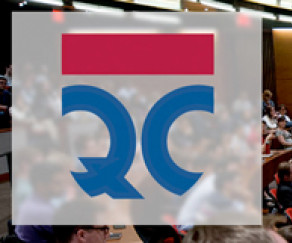How Penn Law’s Quattrone Center works toward a fairer criminal justice system
Penn Law’s Quattrone Center for the Fair Administration of Justice is a national research and policy hub created to increase the fairness and accuracy of the criminal justice system by preventing errors. Using an interdisciplinary approach, the Quattrone Center conducts data-driven policy level research on the most critical problems facing the criminal justice system, and uses its findings to offer recommendations on the best ways to address the systemic issues that lead to criminal justice error.
Led by Associate Dean and Executive Director John Hollway C’92 and Senior Fellow and Academic Director Paul Heaton, the center has released research findings on a wide range of subjects, from stop-and-frisk to wrongful convictions, and racial disparities in sentencing.
Transcript
John Hollway C’92: The Quattrone Center is a research and policy hub operating out of Penn Law that tries to bring together professionals and social scientists and lawyers from throughout the criminal justice system and really analyze the system to understand how we can make sure that the quality of the system is better, and try to prevent errors in the administration of justice.
Keith Harward: Try to try to beat a parking ticket. Okay, ramp that up to a capital murder case, and in my case two trials – both times I received a life sentence.
Paul Heaton: Historically when we found out that we’ve wrongfully convicted someone, we’ve just said, “Sorry,” and sent them on their way and there hasn’t really been the effort to learn from mistakes. So, the center has pioneered taking methodologies, event reviews for example, from other disciplines and applying them in criminal justice.
Hollway: We work holistically with criminal justice practitioners throughout a jurisdiction to review cases where something went wrong and design environmental changes that those professionals can implement in their own agencies.
Marissa Boyers Bluestine: It’s not bad actors, it’s bad methods. And to have that discussion is so different, and leads to reform in a way that is cooperative and that is helpful and that is long term; that is evidence-based, science-based, best evidence practice based, and that is where the true reform will take hold.
Sandy Mayson: I am a lawyer by training. I had no experience in quantitative methods, and the opportunity to work closely with a bunch of brilliant economists was career changing. I now integrate quantitative methods into my own work.
Hollway: We combine social scientists with legal scholars so that we’re actually asking different questions about what to do about errors.
Regina Austin L’73, William A. Schnader Professor of Law: I run the documentaries in the law program at Penn Law school and we have worked with the Quattrone Center on a number of projects. To a certain extent we are able to translate the research that they do into a form that is accessible to decision-maker and the criminal justice process, as well as people who are impacted by the criminal justice process.
Hollway: We can be sort of the neutral broker in the middle that helps to design solutions that are effective because at the end of the day everybody wants the people who have committed crimes to be held accountable for their actions, but done so in appropriate and thoughtful ways.
Heaton: It’s going to require lots of good data analysis, it’s going to require thinking by the best legal minds, and it’s a real pleasure to be able to contribute to that conversation as a faculty member here at Penn Law and as part of the Quattrone Center.





